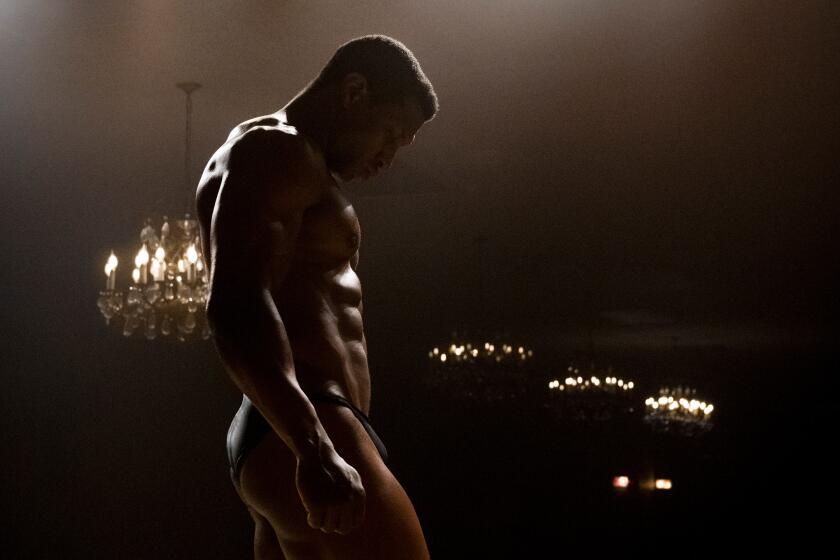MOVIE REVIEW : ‘Lean on Me’ Leans Heavily on Freeman
- Share via
After its prologue, “Lean on Me”(citywide) opens on a maelstrom of choreographed violence at Eastside High School in Paterson, N. J., which practically guarantees that no one will glance at the credits below. As the camera prowls hallways and bathrooms of this predominantly black and low-income school, a sea of kids are picking fights or buying dope at the school door, and a teacher is being beaten into insensibility.
This, the film assures us, was standard behavior until the arrival of tough new principal Joe Clark, who would turn the place around through flamboyantly radical behavior. Clark is played by Morgan Freeman, possibly the most formidable actor on the American scene.
As anyone who has seen him on stage in “Driving Miss Daisy” knows, he is boundlessly gentle. He can also suggest menace so dangerous that you shiver (“Street Smart”). He has a seemingly limitless range, quicksilver modulation, surprise, a dry humor and a watchful intelligence. Using words alone, he can pound another actor right into the ground. Morgan Freeman is not an actor to mess with.
It wasn’t for his gentle side that he was chosen as Joe Clark. If the bullhorn-and-baseball-wielding educator was going to have his inning on the screen, he couldn’t have prayed for better casting than Morgan Freeman. And it is Freeman who will give thoughtful audiences their thorniest problems in “Lean on Me.” When director John Avildsen (“Rocky,” “The Karate Kid”) turns up the heat, staging scenes like that high-school-from-hell opener, or a massive rally at the close, or the many moments of confrontation that dot the film, and then sends Freeman in, against the action, to impose his strength by sheer force of will, it’s thrilling. If ever an actor needed a bullhorn less, it’s Freeman.
He makes you forget--want to forget--the words that Michael Schiffer’s script puts so clearly in the mouth of a music teacher: that Clark is a bully, a despicable man, and one who seems to be threatened by any opinion that runs counter to his own.
The problem with “Lean on Me” is a stripped-down script with no room left in it for complexities, and revved-up direction that makes it move anyway. Schiffer trots out some of the arguments of Clark’s opponents, then drops them. But even more crucially, he doesn’t suggest that there is any educational alternative to invective, to the expulsion of 300 students Clark characterized as “hoodlums,” and to the baseball bat.
The choral music teacher, played feelingly by Robin Bartlett, is fired before the film is a third over. Every person who opposes Clark is either power-hungry, like Lynne Thigpen’s leader of the parents group, or corrupt, like the fictionalized mayor. There’s no middle ground to take.
As in “Stand and Deliver,” everything is geared to previously unmotivated students taking a test crucial to the survival of the school. And the producers have chosen cannily; Avildsen is masterly at mounting a slow-building school-wide frenzy leading up to a minimum basic skills exam.
Clark’s only ally is his friend of more than 20 years, Frank Napier (Robert Guillaume), now Paterson’s superintendent of schools. (Guillaume has a sympathetic presence, but years of television have left him no match for Freeman’s crackle and authority, and scenes in which he must dominate Freeman are awkward.)
Clark’s vice principal, Joan Levias (Beverly Todd), hates his methods but not his objectives. A few of the students are characterized: stocky young Thomas Sams (winning newcomer Jermaine Hopkins), and Kaneesha Carter (Karen Malina White), as the daughter of a young welfare mother whose upward progress is marred by a sudden personal crisis.
You may remember none of the actors, because almost no meat has been put on their characters’ bones. Then, in the middle of all this forgettability, there is Regina Taylor as Mrs. Carter, that young welfare mother, explaining why she has seemingly turned her back on her daughter. It is a scene of such power, variety and observation as to send you away shaken. This is an actress to watch.
The real Joe Clark has very nearly created more problems than he has solved. True, his students work in graffiti-free and drug-free halls, prowled tirelessly by Clark himself. But, glossed over by the film makers are some of the statistics of his administration: Reading scores among his seniors are still in the bottom third of the country, and the overall dropout rate has risen from 13% to 21%.
Those details are not on the screen, which rocks with positive messages of uplift and self-pride. Those are marvelous qualities, not reinforced often enough in mass-audience films with nearly all-black casts. But should it be too much to ask that a film with this much of a lock on its audience’s emotions also challenge their minds? Clark’s way or anarchy: It’s not much of a choice.
More to Read
Only good movies
Get the Indie Focus newsletter, Mark Olsen's weekly guide to the world of cinema.
You may occasionally receive promotional content from the Los Angeles Times.










